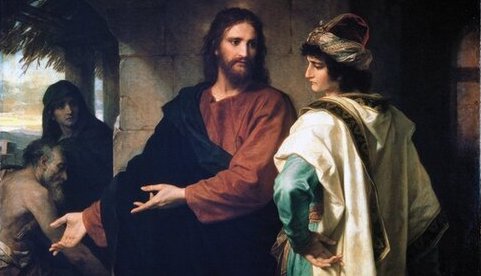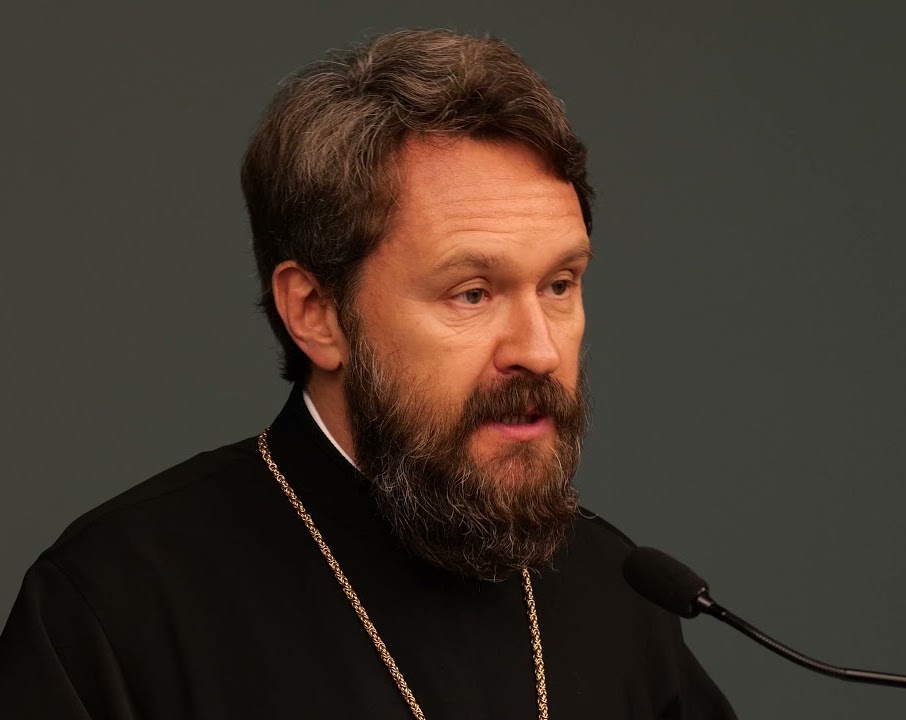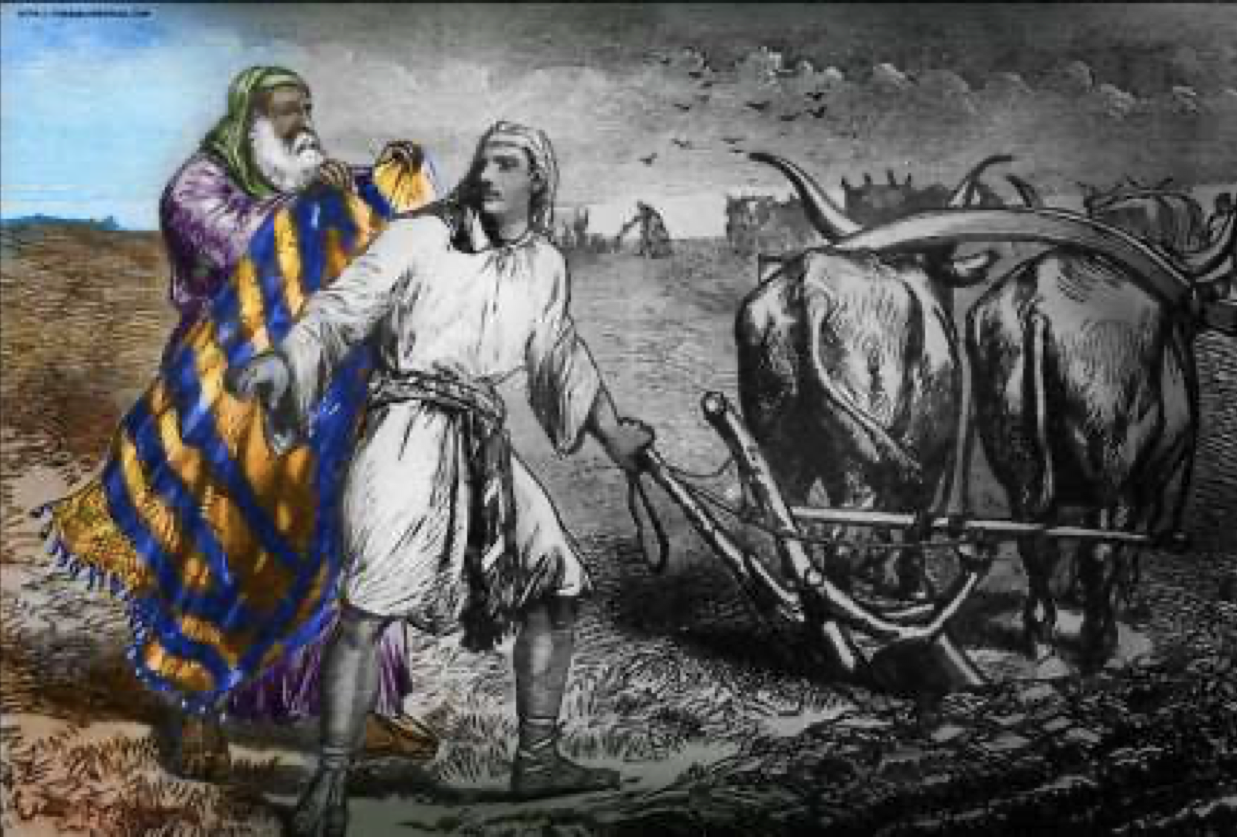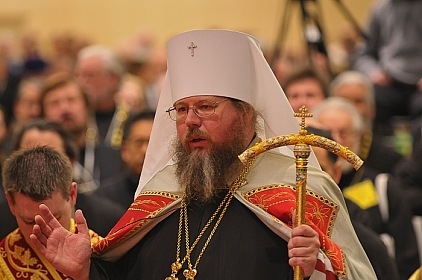
Matthew 28:16-20 (Matins)
1 Corinthians 15:1-11
Matthew 19:16-26
Everything
".... Go! Sell what you have, and give to the poor! .... And come, Follow Me!"
In the Name of the Father and of the Son and of the Holy Ghost.
Amen.
A spiritual son of decades past (now a priest) recently told me
that Jesus' ministry might be distilled into a pair of verbs:
Come and Go
(suggested by Billy Graham).
Our God is a calling God.
He summons us away from the world.
He call us to Himself,
into a mysterious earthly Kingdom of God.
"Come!" He says.
After we have done this,
breathing for some years the Kingdom's life-giving atmosphere,
He sends us into the world
—
"as sheep among wolves"
as
"doves among serpents" (Mt 10:16).
We are to be His ambassadors, His emissaries, His chosen spokespeople.
"Go!" He says.
Two verbs,
which are gateways:
Come
and
Go.
The first is a gateway that leads away from a broken and gritty world
into a Divine realm of goodness.
Here, we become entirely new,
yet
we
reclaim what is ancient and original:
a garden-like place of personal sanctity
and uncompromised
communion with God,
no shadows.
The second is a gateway out of this marvelous light, out of this splendid garden,
back into a world of aching need
and
wounded bodies and disease and, yes, lost souls.
In this we follow the most sacred pattern of the God-man,
Who left the glory He had before the world was (Jn 17:5)),
emptying Himself (Phil 2:7),
and
then becoming the servant of all (Mk 9:35).
These are the imposing monuments standing before us as we view the vast plain of human history.
These are the principal landmarks.
But what exactly are they?
Why should they figure so centrally in the Divine project of human salvation?
Doesn't God have any pixie dust to effect our salvation?
A priest once told me, "No, Father. God just sweeps everybody into Heaven!"
Apparently he has not read the Gospels.
What is the answer to this riddle?
It lies in our Gospel lesson this morning:
Now behold, one came and said to Him, "Good Teacher, what good thing shall I do
that I may have eternal life?"
So He said to him, "Why do you call Me good? No one is good but One, that is, God."
(Mt 9:9-10)
|
The Master immediately pulls him up short.
He confronts him.
We might be tempted to say,
"Was that necessary?
Wasn't this man simply asking a sincere question about what he must do to please God?"
But this confrontation turns out to be the point of the passage.
We are given to know that eternal life with God is not attained by checking off a list,
much less in receiving pixie dust.
The key phrase here is this one:
what good thing shall I do .... as if goodness
might be achieve so easily.
You see, I recycled bottles.
I visited the sick.
And I gave the poor.
But, it turns out, that salvation is not about earning merit badges on your scout uniform.
It is about transforming your inner life.
By declaring that God alone is good,
Jesus announces a program that will require not the mere doing of a deed
but
rather the giving of a whole life.
For the whole program of attaining goodness turns out to be nothing less than to become God in some sense.
It turns out that
deification (theosis) alone is the path to eternal life with God.
Here, we move closer to understanding the two gateways.
God must confront us.
When I attended Episcopalian seminary,
a bishop asked my group,
"What must the Church do?
What must it be?"
I replied that the Church must understand that it is receiving
people who have encountered God.
They want to know,
urgently want to know,
"What comes next?!"
I was mocked for this reply.
And I later met with no Episcopal Church which took this point of view seriously.
God must confront us.
Confrontation is God's response to the famously unsteady human heart.
It is God's remedy for the stubborn ego with its self-love and its inveterate instinct for self-pleasure.
Consider the history of the human race east of Eden.
In a rebellion reminiscent of the War in Heaven,
the migration of humankind begins with an act of willfulness, rejecting God's authority.
It is then marked by fratricide.
Later, a tower at Babel is built suggesting a threatened human invasion into Heaven,
again,
recalling the War in Heaven.
God must scatter these peoples.
Let them speak myriad languages
discouraging conspiratorial talk.
Ultimately,
He drowns His beloved world in a sea of endless rain
because the thoughts of men were only evil continually
(Gen 6:5).
Creating anew,
God begins once again with high hopes,
but immediately His Creation is gored by
father drunkenness
and
mother incest
(Ham's with his mother).
The pattern is repeated with the throw-back cities of Sodom and Gomorrah,
recalling the ante-diluvian world
where the rape of an angel is planned.
God's erasure of these evil places
represents a hope for conversion.
But this hope is quickly dashed ....
this time
by father drunkenness
and
daughter incest.
The career of the human race describes a wandering people in all senses of that word.
We wander by the way.
Each man and woman pursues what seems best to him or her.
The trajectory of life,
with each new experiment of creation,
is always the same.
We wander away from God and descend into the preoccupations of our animal bodies.
In this,
the lost tribe of Gad
is a fitting tableau for the entire human lifeworld.
It begins under God's blessing and living in harmony with God
but then devolves into
swine, a culture of death, demonic possession, an aversion to God, Who actually comes into their midst,
but is pushed away.
For the gift of human freedom
—
which opens to us every choice,
any direction,
and
all predilections
—
has opened to us also the worst of all choices,
which is life without God,
deserving its
infernal name:
Hell.
As we read the second half of our Gospel lesson,
we learn how dangerous self-love and the unremitting pursuit of self-advantage and pleasure can be:
Then Jesus said to His disciples, "Assuredly, I say to you that it is hard for a rich man
to enter the kingdom of Heaven ....
"And again I say to you, it is easier for a camel to go through the eye of a needle
than for a rich man to enter the Kingdom of God."
(Mt 19:21-24)
|
Upon hearing this the Disciples "were greatly astonished" (Mt 19:25).
The Greek infinitive verb,
εκπλησσω
/
ekplesso
suggests they were astounded.
They were confounded.
They were driven to distraction.
Their minds were spinning!
What they have just heard constitutes an earth movement in their lives,
an earthquake.
God confronts us,
cutting the ground out from under our feet!

In a recent talk at St. Vladimir's Theological Seminary,
the great Orthodox theologian Met. Hilarion Alfeyev
shared that he had been reading a "remarkable book" one autumn afternoon in a garden.
This book would spur him to write his magnum opus
(after his magisterial five-volume work on Orthodox Theology),
which is only recently released,
Jesus Christ: His Life and Teaching
(St. Vladimir's Press, 2019-2021)
in six volumes.
The "remarkable book," which so moved HE Met. Hilarion,
is
entitled
simply
Jesus of Nazareth.
Its author is Pope Benedict XVI.
In it, Benedict's words are indeed remarkable
for a man accounted to be one of the three greatest theologians
of the Western Church.
Christianity, he says, is not a religion of the book.
It is not a philosophy.
Neither is it a body of teachings.
It is an encounter,
an encounter with a person:
Jesus of Nazareth.
We find these same convictions at the heart of
his encyclical letter,
Deus caritas est
(God is love):
|
Being Christian is not the result of an ethical choice or a lofty idea, but the encounter
with an event, a person, which gives life a new horizon and a decisive direction.
(Section 1)
|
He ponders these insights more fully.
He continues,
|
The decisive moment in Paul's life took place during the third decade of the first century.
Much has been written about this from various points of view, and it is certain that here
there was a turning point, a change of perspective .... He began to think about everything
that had constituted the reason for his existence up until then as a waste of time, as rubbish.
|
He looked back on his whole life and realized, it was garbage.
Calling to mind St. Luke's Book of Acts,
Benedict continues that the Evangelist
had set out the Damascus Road scene as a drama in three acts:
The average reader dwells upon the details, like the light from the sky, the fall, the blindness ....
[But all of these things] are all related to the center of this episode: the Risen One appears like a
splendid light and speaks to Saul; he transforms his way of thinking and his life itself.
|
You see, Paul has encountered God.
In the ancient Church,
Benedict emphasizes,
baptism was also called illumination, because it makes us see the light.
What is referred to theologically takes place physically for Paul. Paul was transformed not by
any thought of his own, but by an event, by the presence of the Risen One. This encounter is
the center of Luke's account; it changed [St. Paul's] life, and in this sense it can be called
a conversion.
|

After the pattern of Elisha, who burns his plow
and
then cooks his only oxen on the fire (1 Kings 19:21),
St. Paul burns down his whole world, too.
Truly,
the Apostle has set his hand to the plow,
and
he never looks back again.
In His encounter with the man who seeks eternal life,
Jesus
does not suggest a new pastime.
He does not recommend a retreat weekend.
Indeed,
He does not suggest or recommend at all.
He issues
a Divine command:
"Go! Sell what you have! Give to the poor! And you will have treasure in Heaven.
And come! Follow Me!"
|
Five imperative verbs in the space of a handful of words.
Five Divine commands.
This is not a recommendation.
These are not things we might want to take under advisement.
This is an encounter with God,
Who must no be refused.
Truly, the shocking motto of St. Herman of Alaska Monastery in Platina, California is
right on the mark:
"Death to the World" .... death to worldliness.
If we should ask the Son of God
what we must do to have eternal life,
He will answer always,
"You must put your worldly life to death."
Then,
"Come, follow me!"
Come.
The first gateway truly is astonishing.
We must discard our worldly lives as we would take out the garbage.
More remarkable still,
we must follow Him.
That is, we will be transfigured.
To use St. Paul's language,
we will be transformed,
made into a new man.
"The old man is crucified with Him" (Rom 6:6).
Put to death!
But how is this done?
For who would annihilate his or her world?
Who would willingly crucify himself
except under compulsion?
"Look!" Peter says.
"We have given up everything to follow you!" (Mt 19:27).
So you seek,
these things are accomplished and not by dint of force,
nor cruel compulsion.
People seek this annihilation and crucifixion
freely,
even
long for it.
So what exactly is it that induces people to make this choice?
What is this inner, voluntary compulsion that leads so many, many people
to walk away from their lives and the world?
It is the encounter with God.
God has come into their lives.
This is our understanding of the word Advent .... whether two thousand years ago or tomorrow.
For in this Advent light,
we see that everything up until now as having been
"a waste of time .... rubbish."
This illumination does not project some other thing on to a big screen,
some distraction.
No.
It is searing light cutting through the debris of our inner lives,
It is a light that falls upon .... ourselves.
We see ourselves as we have never done before,
as we really are,
as God sees us.
Yes,
we see the good within us.
But we also see the rubbish which shames us,
which we desperately wish to erase,
to be scrubbed clean of.
What exactly is this worldliness which we now revile?
Yes,
it certainly includes carnality and sexual immorality (1 Cor 6:9).
It certainly includes polluting the Holy Spirit's temple, which is our bodies,
using drugs and alcohol (1 Cor 6:19).
It certainly includes consumerism
represented by the glittering cathedrals we build everywhere known as "malls."
But it also includes fake spirituality .... which is everywhere.

His Beatitude Metropolitan Jonah (Paffhausen) has written,
"There is a temptation to reduce Orthodoxy .... to a rational system of doctrines and .... rituals."
But this is not the thing.
The "one necessary thing," he continues,
|
is the transformation of our souls in theosis, in short, salvation. Just because you have the right doctrine,
pure dogmas and strict observance of the canons does not mean that you are deified. In fact, the great spiritual
Fathers all say that knowledge puffs up, inflates our egos, and inflames our passions. These things will not
save you. They are the context [I might add, they are the nourishment] for the spiritual struggle but are not
its content.
|
If .... we exalt ourselves, we are simply the new Pharisees. You can have perfect obedience to all the rules,
and if you do not love your neighbor, [the rules] condemn you. You can fast perfectly, but if you judge and
criticize your neighbor, you condemn yourself.
The Fathers tell us, over and over, that until we have achieved a substantial degree of purification from the
passions, we must not touch theology. In the early Church, the three-year period of catechesis was primarily
devoted to moral teaching from the Old Testament.
(Personal communication)
|
In following Jesus,
we see a new horizon within ourselves,
a new birth,
a noble way of life,
which we instantly recognize
and
know to be true
for it had once been our own purer selves:
the simplicity and beauty of our young minds and souls.
No one need persuade us of its authenticity.
No wonder the Christian cries out,
"Free me!"
"Free me from this trap!" (Ps 31:4).
"Free me from this prison that might praise Your Holy Name!" (Ps 142:7).
"Free me from my anguish!" (Ps 25:17).
Free me from the grip of the wicked!" (Ps 71:4).
|
I add that I read the Psalms as being a psychomachia.
The enemy, the wicked one, is our own worst selves.
Of course
the next stage of our life with God is love, Who is love.
Pondering the mysterious connection between God's own Triune nature
and
His redemption of mankind,
the Trappist monk, Thomas Merton, wrote,
"And He did it all with relationship."
For His own nature, His own Triune nature, is relationship.
And He redeems the world with Himself.
He redeems us through relationship.
You see,
we are walking along a road to Emmaus,
and
we have an encounter .... with the one Who is perfect relationship.
And perfect relationship is perfect love.
Through and in this relationship
we grow into Him,
becoming more and more like Him.
He is our only thought and desire
until we are fully united with Him.
Is this not the way of all love (that only Divine property on the earth)?
Is this not the earthly ideal of every marriage ever made
—
where the two become one (Mt 19:6) .... indistinguishable from each other.
The earthly ministry of Jesus may be distilled into a pair of verbs:
Come and Go.
We are called, and we are sent.
He calls us into His marvelous light,
in which all things are illumined.
We are able love this new world without hesitation or impediment,
for we have been cleansed of every shame.
Only purity and goodness remain now.
We have entered relationship with the One Who alone is good.
And then we are sent.
We are sent into a world of aching need.
We are sent to inspire the ones who have been sent to us.
We inspire them with the only force on earth
capable of changing lives,
capable of transforming all that is before us,
capable of instilling new life.
And that force is love.
Sweet, sweet love.
Go, therefore, into the world as sheep among wolves,
as a dove among serpents.
Lead with your heart, but also guard it.
Guard your heart, but also share it.
What is the way through these daunting paradoxes?
We do not know.
But we do know and trust
that God will show us the way.
"Come to the place I have chosen for you," He says.
"And I will give you the words to speak" (Lu 12:12).
In the Name of the Father and of the Son and of the Holy Spirit. Amen.



